App-based "bike sharing" systems have grown unbelievably fast in Chinese cities. But what does bike sharing really look like? How does it use technology to create new options for urban transportation?
2016
When I first visited Shanghai in mid-2016, transportation was a bit tricky. I wasn't staying particularly close to a metro station. Buses were infrequent and sometimes tightly packed with people.
For a while I was thinking of buying a small electric scooter, which seemed to be fashionable at the time:
Turns out I didn't have to. On a visit to the inner city I spotted my first Mobike:
Mobike
Traditional bike sharing schemes have been around for a while. They seem to work best in European cities, but they're still a little awkward - you have to start renting at a designated bike rack and you have to return the bike to a designated bike rack.
Mobike (摩拜单车) remove the awkward part by making the bikes "rack-less". Billing themselves as "the perfect last mile solution", their process is:
- Use the app on your phone to find a bike.
- Scan a QR code on the bike and the app remotely unlocks it.
- Ride away!
- When you're done, leave the bike anywhere that it's legal to park a bike.
The app integration was smooth - you pay a one-off refundable deposit of 280RMB (US$40) via WeChat Pay and send some ID details. Then find a bike, unlock it, and you're away:
The rental cost? 1RMB (US$0.20) per half hour. (For comparison, this is approximately the cost of riding one station's distance on the Shanghai metro.)
Being able to rent a bike like this is perspective-changing. I'd rent one to ride two blocks, end the rental when I got there, and then re-rent the same bike five minutes later to ride back.
I didn't see a lot of people riding Mobikes, but it was midsummer in Shanghai so I put that down to the sweltering weather. In the trendier parts of town they were on every street corner, but they were rare in the outer areas of Shanghai where I spent most of my time.
All the same, I was sold. I rode Mobike every chance I could, and I was pretty happy to see the English language version of the app prompting to get in touch about bringing Mobike to "your city".
What's a Mobike?
A "Mobike" is a medium sized bicycle (not ideal for a 190cm person such as myself, perfect for the average Shanghai resident). They are sturdily built, clearly engineered to minimise maintenance. They have a fully enclosed driveline (no chain), drum brakes (less exposed parts), and spokeless solid wheels:
The high-tech part is the lock which goes through the the rear wheel. The lock connects to the mobile phone network, and also contains a GPS so each bike can transmit its location for display in the app. I'm not certain how the lock's battery is charged, my guess is it happens when the bicycle is ridden.
I was sold! I present this enthusiastic Facebook post as proof:
Leaving Shanghai at the end of summer, I hoped Mobike would grow and get enough adoption to survive until my next visit...
2017
Fast forward to March this year, and I was back in Shanghai again. My concerns about Mobike fading into obscurity had been baseless - in just over six months, bike rentals had exploded everywhere!
Mobike was no longer concentrated in only the busiest parts of the city. Most bikes being ridden in the street were now "bike shares". Every morning there was a thick crowd of share bikes around my local metro station:
They were gone by night-time, after everyone had ridden one back to their apartment building and parked it outside:
Mobike Light
In October last year, Mobike introduced Mobike Light.
The original Mobike was hefty, but Mobike Light is closer to a standard bicycle. Some of the heavy low-maintenance features like the sealed drivetrain have been taken off - Mobike Light has a regular bicycle chain. It also has these funky looking tyres:
(Most share bikes seem to have air-free tyres of some kind.)
The other addition was a front basket, which doubles as a mount for a solar panel:
Something to keep the battery charged even when the bike is sitting idle.
Ofo Bike
Despite exploding in size, Mobike is not the only bike sharing company in Shanghai. The goliath in China's bike rental world is Ofo (casually called 小黄车 - little yellow bike):
Ofo apparently pre-dates Mobike. I don't remember seeing their bikes on the streets of Shanghai last summer, although maybe I missed them. By this spring, noone could miss them.
Ofo's three bike models are all a little small for this gangly foreigner. However one model has the killer feature of an adjustable height seat, making for a less cramped riding experience.
Ofo takes a very different approach to bike sharing technology. There is nothing electronic on Ofo's bikes. They have an ordinary mechanical combination lock:
To rent a bike, you type the bike's identification number into the app (or scan a QR code). The Ofo app returns that bike's lock combination. Ride the bike as long as you like, then lock it and end the rental in the app.
This low tech approach means that Ofo has to trust their users a lot more than Mobike. There's nothing stopping you from leaving a bike unlocked when you end the rental, then riding it again as much as you like. I found a number of Ofo bikes left unlocked, or left with the lock closed without spinning the combination. Or an unscrupulous rider can "report a problem" with their bike at the beginning of the rental, cancelling their obligations, but then continue to ride it around.
Ofo don't seem overly worried about this. I think (like Mobike) their main concern is gaining market share. Nominally Ofo bikes cost 1RMB (US$0.20) per hour, but I rode Ofo at least thirty times and paid a grand total of nothing (including my initial 99RMB deposit which was refunded.) I think until the rental exceeds half an hour, the fee is zero.
Ofo Global
Like Mobike, Ofo want to grow outside China. They hit Singapore in February. Outside Asia, Ofo US exists and provided free bikes at SXSW this year.
The Other Contenders
Numerous other bike share companies are jostling for market share. Overnight, rows of shiny new bicycles will show up outside a metro station.
Some of the competitors are basically copycats, but the most interesting ones are trying to innovate in one way or another.
Gonbike
Gonbike (共佰单车) seemed to be scaling up when I was in Shanghai last month:
At first glance, their bikes look a lot like Mobike. However, they have added some features.
This red knob allows the rider to adjust the seat height (not possible on Mobike):
The basket on the front holds a solar panel, similar to Mobike Light. However it also provides a mount for the rider's phone, complete with charging cable:
Beefly
(I want to read this name as Beef-ly, but it's Bee-fly.)
I didn't see Beefly (蜜蜂出行) bikes in Shanghai, only in nearby Hangzhou. The ones I saw were folding electric bikes with offroad-friendly tyres:
Apparently Beefly are also rolling out electric "Harley-style" scooters:
(Photo courtesy Lieyunwang, whose post says Beefly plans to roll out 300,000 nation-wide.)
Electric options are neat, but the charging requirement seem to clash with the freedom to park anywhere. Maybe in more hilly cities, or perhaps Beefly has some clever way to solve the charging problem.
Xiaoming
According to Technode, in December 2016 Xiaoming (小鸣单车) was the third most accessible bike sharing company in Shanghai. It shows how fast this scene is changing that four months later there were multiple other companies just as visible.
In terms of their bikes, Xiaoming is pretty unremarkable - not very different to Mobike.
EDIT 18/4: I missed this, but see via @icopilots on Twitter that Xiaoming's bikes have a polymer chain!
U-Bicycle
U-Bicycle (优拜单车) are another company whose technology closely resembles Mobike. Their innovation seems to be a scooter-esque step-through frame - extra friendly to long skirts and dresses.
While I was in Shanghai, rows of U-Bicycles popped up overnight at a nearby metro station:
Encouraging for U-Bicycle, a week later most of these were gone.
Bluegogo
Bluegogo (小蓝单车 - "little blue bike", a clever twist on Ofo's nickname) seems well established. Like Ofo, they have some plans to expand into the US - specifically San Francisco. Their English language web site is pretty comprehensive, and shows iconic San Francisco backgrounds behind the riders.
Despite this, their San Francisco launch didn't go very smoothly. Announcing the same "dump bikes on every street" pattern of rollouts that seems to work in Chinese cities earned them a backlash from local government back in January. A quick search of Twitter and Instagram indicates that their rollout is still pending.
Qibei
I don't know much about Qibei (骑呗单车), but they seem to be copying Mobike very closely. Even to the point of having two models - one bike with a solid drivetrain and wheels, and a "Light" model (pictured) with a normal chain.
Qibei and Bluegogo bikes aren't technologically interesting, but they help show the extent to which bike sharing is growing.
I've been back in Australia for three weeks now, and I don't doubt that at least one totally new bikeshare company has appeared on the streets of Shanghai in that time.
Inside the technology
I would not feel comfortable taking apart a share bike's lock, but someone did: this blog post looks inside the locks of Mobike, Xiaoming, Ofo and Bluegogo. I am assuming these locks were somehow legitimately sourced!
(NB: the above link is a mirror of a WeChat or a Weibo post. I don't know the original, if anyone has a link please let me know.)
The post exposes the difference in engineering level and cost:
Mobike uses some pre-made modules on their design - a cellular communications module (SIM800L), a separate GPS module, and an application processor (STM32) to control everything. Like their bikes, the electronics seems to be carefully engineered. However using this many modular components probably increases the overall parts cost.
(Photos: yopai.)
On the other hand, Xiaoming use a much cheaper Bluetooth-only lock. Cellular connectivity and GPS are provided by the user's phone. This way, cost is kept down. The post even mentions that the design seems to be from another Shenzhen "smart lock" vendor.
(Photo: yopai.)
In terms of engineering effort, Bluegogo are somewhere in the middle. They use the chipset from a Mediatek feature phone (MTK2503) which gives them cellular, GPS, Bluetooth and WiFi in a single package. Their lock controller circuit board is probably a verbatim Mediatek reference design, as evidenced by WiFi area left without components in one corner. Using a reference design like this seems like a smart move, it means Bluegogo invested minimal engineering time and cost. It's probably cheaper to manufacture than the approach taken by Mobike, with the same functionality.
(Photo: yopai.)
Ofo is, naturally, the most low tech lock:
(Photo: yopai.)
Money
Investment in bike sharing is substantial. Mobike has taken US$300 million in total investment, from investors including Tencent Holdings and the US' Sequoia Capital.
Ofo has investors including taxi giant Didi Chuxing, mobile company Xiaomi, and a US hedge fund. Their most recent D funding round was US$450 million.
Even the small players are thinking big - U-Bicycle announced a US$22 million A funding round last November.
Land Rush
Every bike share company is struggling to capture part of a fundamentally new market (ignoring the days when people actually owned their commuter bikes, a trend which seems to have visibly declined in Shanghai.)
Most concerning is the extent to which each company is following an Uber-esque market strategy - burn investor money bombarding the market with dirt cheap products, until you can edge out the competition. At some point they'll be forced to actually release a profitable business plan, but who knows what that might look like.
Bike Junk
Matching the lack of economic stability are concerns about environmental sustainability. Flooding the streets with cheap bikes means they inevitably wear out or break.
Only a few companies seem to have spent time and money engineering a higher quality product, to reduce the overhead of maintenance. In the case of Mobike, the introduction of Mobike Light suggests they may have been forced to cut their costs in order to compete.
Chinese social media has many articles about broken bikes, including images like these:
(Photos from china.com news, December 2016. More pictures at the link.)
Although the same photos often appear in multiple articles, so perhaps this problem is not that widespread.
Around Shanghai, I saw a few bikes (all Ofo, as it happens) with flat tyres, broken seats, busted locks, and one notable bike that seemed to have been dunked in a muddy canal for a few weeks and then put back on the street. Although the broken ones comprised only one percent (at most) of all the bikes I saw.
To Ofo's credit, I also saw an Ofo-jacketed roving bike mechanic working hard on the side of the road. So it seems that Ofo (and probably their competitors) are putting money into maintenance. Although I wonder how well those maintenance crews will manage as more and more bikes show up.
City Planning
Unlike with Uber, there's no equivalent of a taxi lobby to argue the case for keeping cycling arrangements the way they were. All the same, it seems that in places the free-for-all of bike sharing has needed to be reigned in.
Reminiscent of the "ride share pickup" zones near airports, the bigger train stations in Shanghai (such as Long Yang Road) now have supervised bike share parking areas (branded and segregated by bike share company). I assume this was a reaction to the stations themselves being swamped by more and more bikes, either left by riders or dropped off by companies.
Bike Sharing Is Here
It's going to be interesting over the next few years, as the war over Chinese turf settles and the winning companies get to expand into other countries' markets. Such expansion will have to account for a number of differences: bike riding cultures, different approaches to public space, and relative obscurity of micropayment services to name a few.
I look forward to seeing how bike sharing matures and tackles these.
As a bike-loving Australian in Melbourne, I am sad that these services will probably never come here. Melbourne's own traditional city bike scheme has languished. This is mostly blamed on Australia's compulsory bike helmet laws. In addition to that obstacle, I find it hard to see a future where "dockless" ride sharing bikes parked on Australian city streets wouldn't be damaged, stolen, or stripped for parts. Which is a shame.
If you're Chinese, or even based in China, then I'd love to know what you think about bike sharing and how your impressions and experiences compare to mine. Leave a comment!
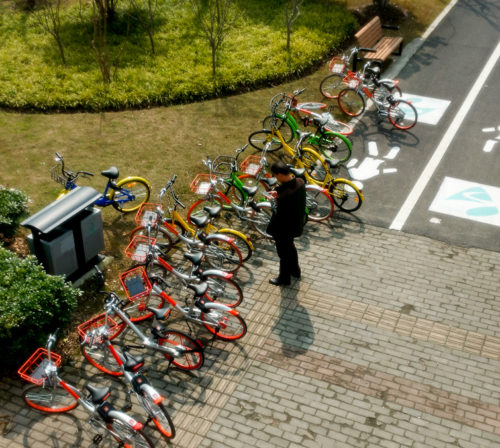
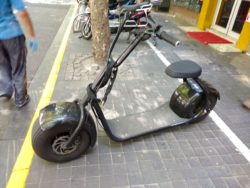
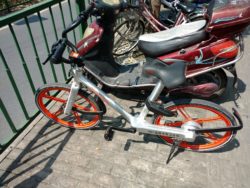
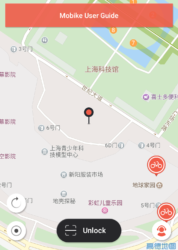
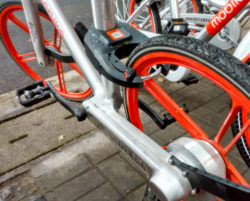
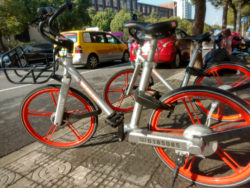
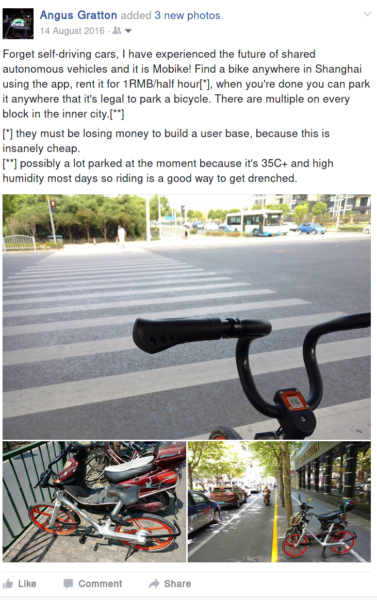
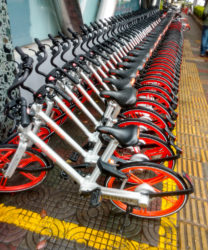
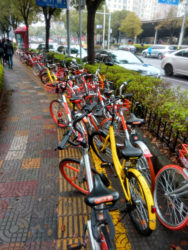

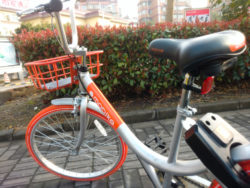
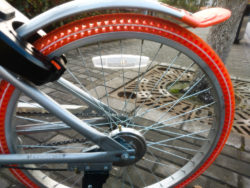
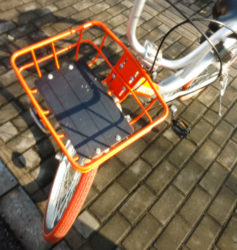

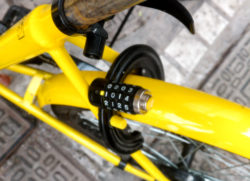
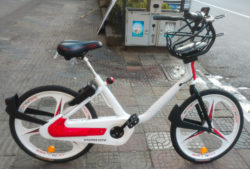
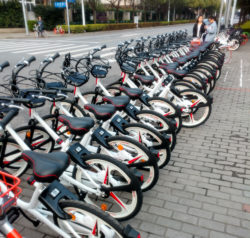
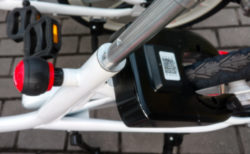
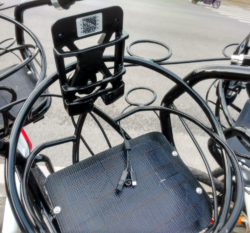
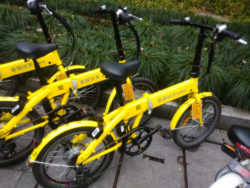
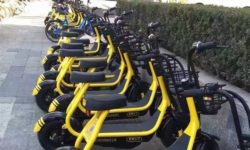
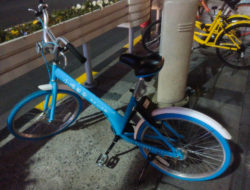
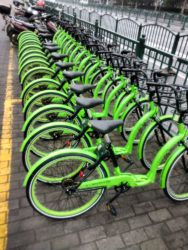
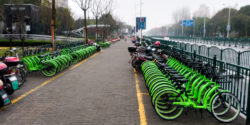
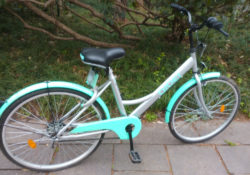






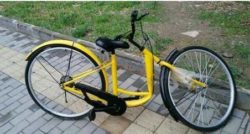


Thoughts on “Sharing bikes in Shanghai”